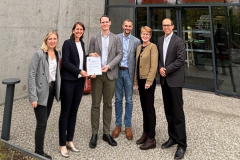To mark World Recycling Day on 18 March, DS Smith is publishing a study on The impact of the health crisis on French recycling habits .
According to this study by the London-based corrugated packaging manufacturer, nearly 30% of French people have observed a clear increase in the volume of waste recyclables produced by their household since the beginning of the covid-19 epidemic.
In addition to increased time spent at home This sharp increase in packaging to be recycled is due to changing consumer behaviour in the last 12 months :
more than one in two French people (53%) believe that they are buying more frequently online, and 29% of those surveyed say they are recycling more e-commerce packaging.
In addition, the successive confinements have complicated the transport of materials and slowed down the collection of waste as well as the operation of many sorting centres throughout the territory.
Consequence of this surplus, 61% of French people say they lack space in their recycling bins.
But, 79% plan to continue and even increase, the frequency of their purchases on the Internet.
And although 80% of respondents express concern by the environmental impact of this surplus, 54% of French people say they are poorly informed on sorting instructions and more than 70% say that there is an urgent need to better inform and raise awareness among the population on sorting household waste.
"With packaging piling up in our homes, there is a central issue of good recycling practices, says Mike Harrison, Southern European Director of DS Smith Recycling. Although concerned about the environment, the French are dissatisfied with the lack of clarity or the little information available on the subject of sorting. Admittedly, real efforts have been made, but the study reveals that there is still a great deal of work to be done to raise awareness about sorting, recycling and waste reduction."















